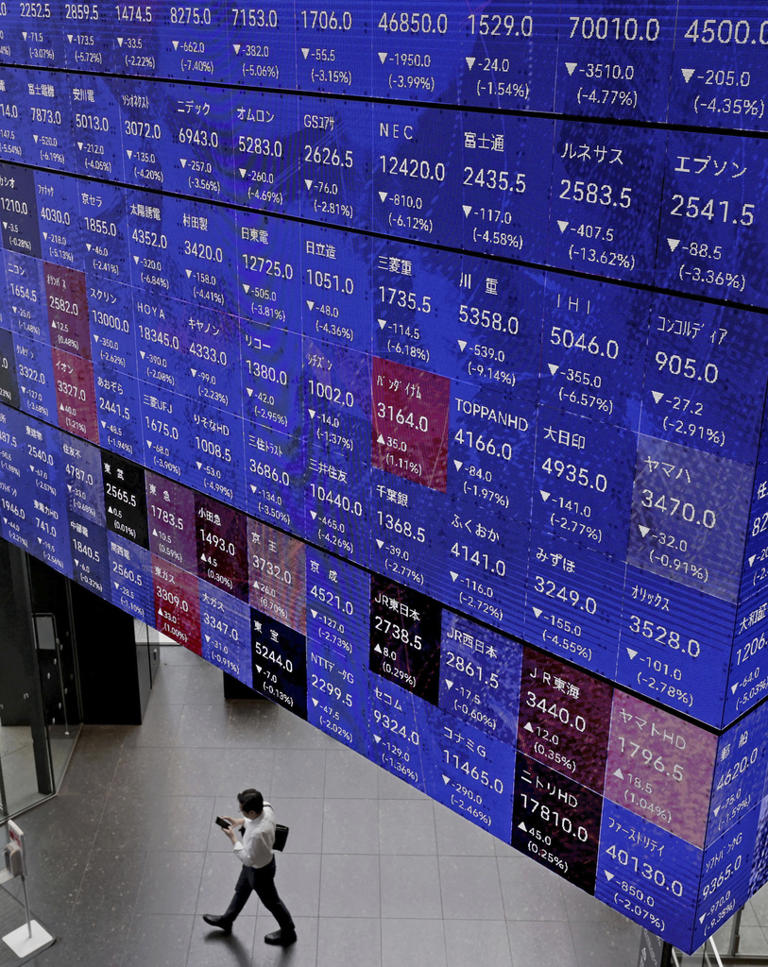Asian shares experienced a cautious decline on Tuesday as investors awaited crucial central bank meetings scheduled for the week. The Federal Reserve, the Bank of England, and the Bank of Japan are all set to hold significant monetary policy meetings, which are contributing to the market’s uncertainty and cautious trading atmosphere.
In Japan, the Nikkei 225 index fell by 0.5% to 38,268.72, reflecting a subdued market sentiment. Australia’s S&P/ASX 200 decreased by 0.9%, settling at 7,915.10. South Korea’s Kospi dropped 0.7% to 2,747.06. In Hong Kong, the Hang Seng index slipped 0.8% to 17,093.32, while the Shanghai Composite experienced a 0.7% decline, ending at 2,871.62. Jing Yi Tan from Mizuho Bank noted that market participants might be struggling to position themselves appropriately ahead of these pivotal central bank meetings, which could set the tone for future market movements.
In Japan, there was a slight positive development as the nation’s unemployment rate for June edged down to 2.5% from 2.6% in May. This decrease marks the first improvement in five months, indicating a modest stabilization in the labor market. This improvement, however, did not significantly lift investor sentiment across broader markets.
On the other side of the globe, U.S. stock indexes closed on a mixed note on Monday, setting the stage for a week filled with significant earnings reports from major companies and the Federal Reserve’s upcoming meeting on interest rates. The S&P 500 saw a modest increase of 4.44 points, or 0.1%, reaching 5,463.54. This slight gain came after the index had experienced its first back-to-back weekly losses since April, reflecting some recovery. Meanwhile, the Dow Jones Industrial Average fell 49.41 points, or 0.1%, to 40,539.93, and the Nasdaq composite added 12.32 points, or 0.1%, to 17,370.20.
The market saw notable movements from individual stocks. ON Semiconductor led the market with a robust 11.5% gain, driven by a strong profit report that exceeded analysts’ expectations. McDonald’s also saw a 3.7% increase in its stock price, despite reporting quarterly profit and revenue that fell short of forecasts. Analysts attributed McDonald’s stock rise to better-than-expected performance in U.S. restaurants, countering some of the investor fears.
Conversely, the oil-and-gas sector faced pressure as oil prices dropped, affecting related stocks. ConocoPhillips saw a decline of 1.6%, and Exxon Mobil fell by 1%. The drop in oil prices was attributed to concerns over reduced crude oil consumption in China, which is grappling with economic challenges that could lower its energy demand.
Looking ahead, Wall Street is preparing for earnings reports from several major technology companies, including Microsoft, Meta Platforms, Apple, and Amazon, later this week. These companies are particularly influential due to their large market capitalizations, and their results could significantly impact the broader market. The excitement around artificial intelligence (AI) technology had previously driven up Big Tech stocks, but there has been a recent slowdown. Investors have become cautious, reflecting concerns about high valuations and underwhelming earnings reports from companies such as Tesla and Alphabet. Bank of America strategists, led by Savita Subramanian, have observed that the initial enthusiasm for AI may have waned, with a greater focus now on the actual monetization of these technologies.
Despite the volatility among Big Tech stocks, other segments of the market have shown strength. Smaller stocks, particularly those in the Russell 2000 index, have surged, driven by expectations that the Federal Reserve might start cutting interest rates soon due to slowing inflation. The Russell 2000 index, despite a 1.1% decline on Monday, has risen by 9.2% for the month so far, highlighting its resilience amid broader market fluctuations.
The Federal Reserve’s upcoming policy meeting is highly anticipated, with expectations that the central bank will maintain current interest rates. However, there is a broad expectation that it may begin easing rates at its following meeting in September. Treasury yields have remained relatively stable, with the yield on the 10-year Treasury note slipping to 4.17% from 4.19% late last week, down from a high of 4.70% in April. This stability in yields reflects the market’s anticipation of future rate changes.
In the energy sector, benchmark U.S. crude oil prices fell by 19 cents to $75.62 per barrel. Brent crude, the international benchmark, also saw a decline of 19 cents, trading at $79.59. In currency markets, the U.S. dollar inched up to 154.05 Japanese yen from 154.00, while the euro dipped slightly to $1.0816 from $1.0826.
Overall, the cautious trading observed in Asian markets reflects a wait-and-see approach as investors anticipate crucial policy decisions from major central banks and prepare for key earnings reports from leading global companies. This period of uncertainty is marked by significant attention to central bank actions and the performance of major technology firms, which are expected to influence market trends in the near term.
